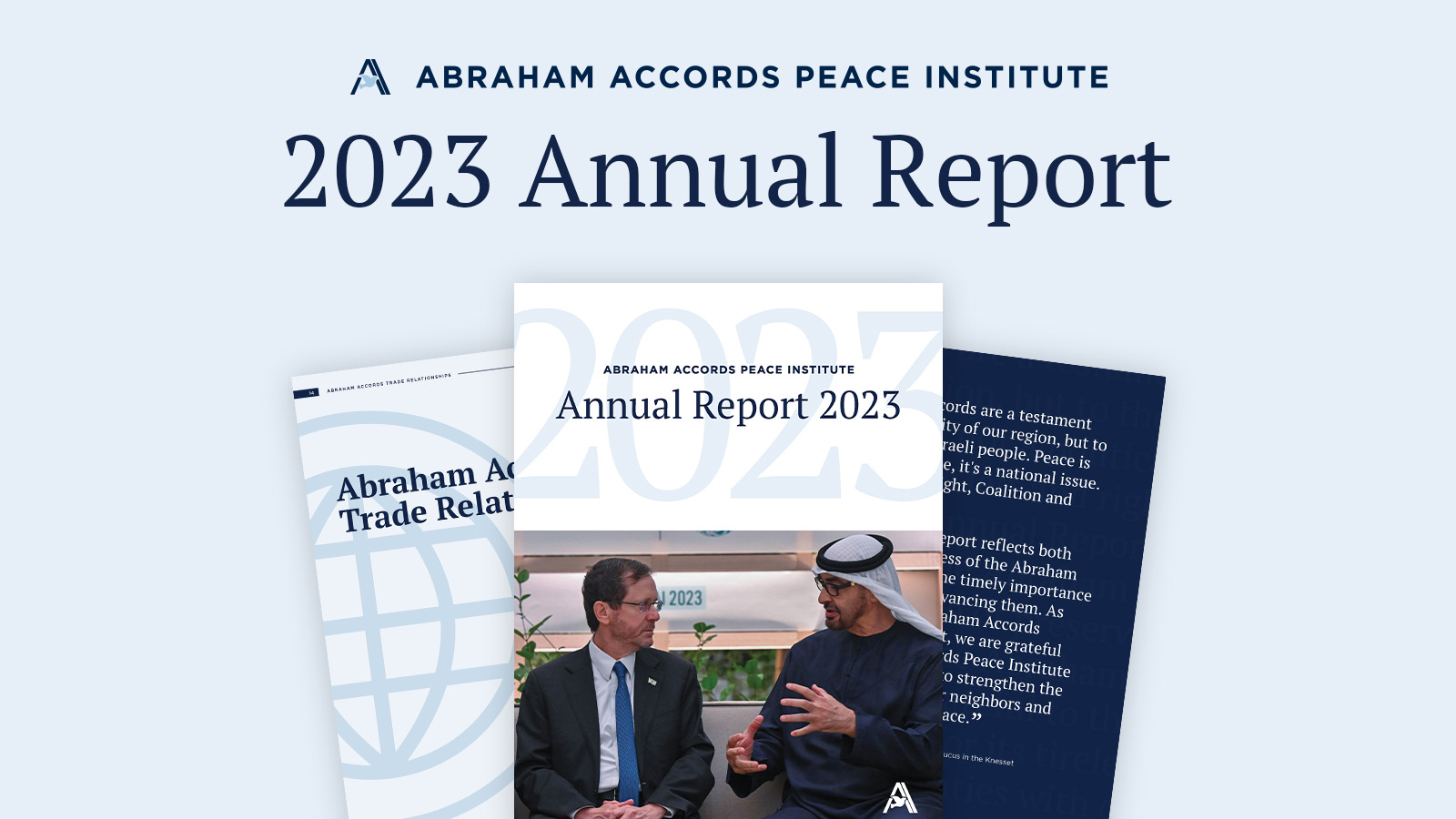Top Stories
Abraham Accords Peace Institute: In 2023, Abraham Accords Ties Break New Records, Remain Steady After October 7
April 01, 2024

READ FULL REPORT
READ EXECUTIVE SUMMARY
Hebrew Executive Summary
JERUSALEM, ISRAEL /WASHINGTON, D.C. -- The Abraham Accords Peace Institute released its 2023 Annual Report today, analyzing the progress of ties between the countries of the Abraham Accords in the third full year since the signing of the historic agreements.
The report finds that Abraham Accords ties continued to deepen in 2023, which saw numerous high-level visits and delegations, the expansion of groundbreaking bilateral and multilateral frameworks, important interfaith developments, and unprecedented joint initiatives bringing together innovators, investors, experts, academics, and women leaders from across the region.
According to Israel Central Bureau of Statistics (CBS) data, trade among Accords countries[1] broke new records in 2023, exceeding USD $4 billion, a 16% increase year over year. In Q1-Q3, Abraham Accords trade was up 24% year over year. Q4 saw only a 4% decrease, as compared to an 18% decrease in Israel’s overall trade. AAPI estimates that if trade not accounted for in the CBS data is added, such as Israel’s exports of natural gas to Egypt and gas and water to Jordan, defense-related trade, and services, software and cyber, the true value of Abraham Accords trade in 2023 exceeded USD $10 billion.
Official total of Abraham Accords trade exceeds USD $4 billion, up 16% Year-Over-Year. AAPI estimates true value to exceed USD $10 billion.
After the October 7th attacks, diplomatic ties remain stable; trade decreases by only 4%, compared to 18% decrease in Israel’s overall trade.
Notable developments in 2023 included the opening of Abu Dhabi’s Abrahamic Family House, the entering into force of the UAE-Israel Comprehensive Economic Partnership Agreement, the official opening of the Israeli Embassy in Bahrain, the Connect2Innovate conference in Manama and Women Connect to Innovate conference in Marrakech, and Israel’s recognition of Moroccan sovereignty over the western Sahara. Tourism trends reflected those of previous years, with large numbers of Israelis traveling to Accords countries and new flight routes being established, while a relatively small number of tourists from Accords countries visited Israel.
2023 was also marked by the launch or expansion of multi-lateral frameworks for collaboration, including the Negev Forum Working Groups meeting, and multilateral dialogue between the cybersecurity chiefs and national security advisors of Accords countries. Cooperation also expanded to encompass additional countries, including India within the framework of the I2U2 Forum. The vision of regional integration took a major step forward with the launch of the India-Middle East-Europe (IMEC) Corridor initiative at the September 2023 G20 Summit. The benefits of establishing an efficient overland corridor connecting East and West via Israel and the Gulf became even clearer in light of the Iranian-backed Houthi attacks on Red Sea shipping.
Following Hamas’ October 7 massacre and the ensuing Israel-Hamas war, diplomatic and trade ties remained steady, with the leaderships of Abraham Accords countries affirming their continued commitment to the Accords. Accords countries were able to leverage the trust built with Israel to coordinate humanitarian aid to Gaza. The war had a strongly negative impact on regional public opinion towards Israel, curtailing people-to-people projects, while also slowing progress towards Israel-Saudi normalization.
AAPI Recommendations for 2024 include:
- Encourage active commitment and investment from allied and like-minded countries, particularly the United States, in order to maintain positive Abraham Accords momentum, and counter inroads being made by negative actors.
- Leverage the potential of multilateral initiatives in order to continue advancing regional cooperation and integration. Examples of multilateral cooperation could include IMEC, I2U2, and regional Free Trade Zones or Qualified Industrial Zones.
- Overcome the infrastructure, logistical, regulatory, security and geo-political barriers to efficient West-East overland trade via Israel and the Gulf.
- Increase the number of coordinated bilateral delegations from diverse sectors. Expand E-Visa and visa waiver programs and ensure smooth travel at all transit points.
- Ensure that Israel’s recognition of Moroccan sovereignty over western Sahara is reflected in all official statements and communications.
- Advance steps aimed at keeping Sudan within the Abraham Accords.
- Pursue a broad range of options for expanding the circle of normalization and cooperation, not only in the Gulf but in Africa and southeast Asia as well.
AAPI Founder Mr. Jared Kushner:
“The Abraham Accords remain a crucial pillar of stability in the Middle East and a symbol of hope that countries can continue to come together to enhance the lives of their citizens. This report demonstrates some of the tangible results of these historic agreements. It is up to all of us to continue our efforts to ensure their full potential is realized.”
AAPI Executive Director Mr. Aryeh Lightstone:
“The Abraham Accords are currently amid their most challenging test in their three short years of existence. The AAPI report demonstrates that the Accords will pass this test and will serve as the blueprint for a more peaceful and prosperous Middle East for all its peoples.
I'm proud of my team at AAPI for serving as a critical platform to address meaningful real time issues for the Abraham Accord countries as they navigate this more complicated and challenging environment. “
###
For media inquiries, please contact Press@aapeaceinstitute.org
The Abraham Accords Peace Institute is a non-partisan, non-profit U.S. organization dedicated to supporting the implementation and expansion of the historic Abraham Accords peace agreements. The mission of the Institute is to strengthen the bonds created through the Abraham Accords, ensure these relationships reach their fullest potential, and expand the circle of countries which are part of the Accords.
[1] AAPI includes within the rubric of the Abraham Accords, the UAE, Bahrain, Morocco and Sudan as nations which normalized relations with Israel between September-December 2020, Kosovo, a Muslim-majority nation that established relations with Israel at the same time, and Jordan and Egypt as legacy peace partners of Israel.